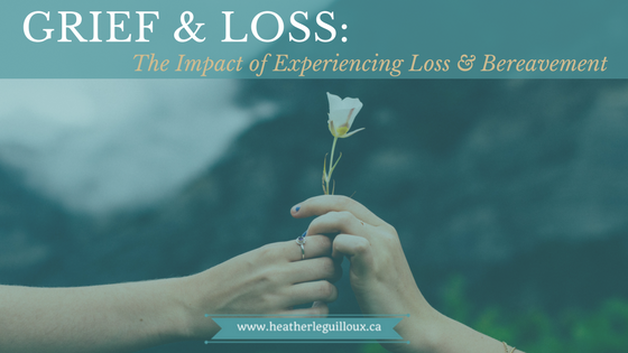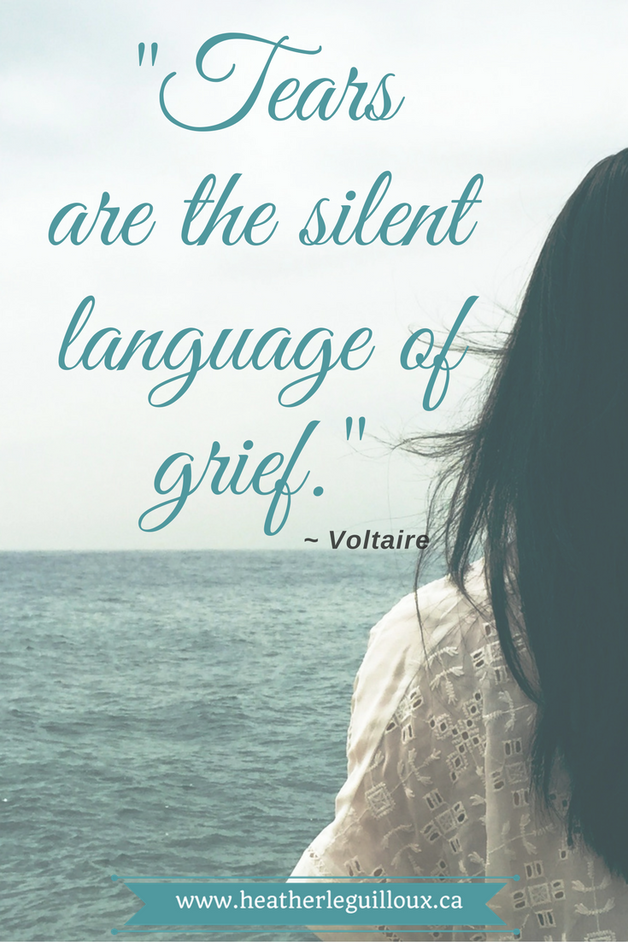|
|Everyone experiences grief and loss to varying degrees and at some point in their lives. This third article in a series about grief and loss we will first explore the impacts a person may experience after enduring a loss or bereavement which includes a segment on complicated grief.
This article will be separated into two sections - the impacts of grief and loss which will be explored through a biopsychosocial-spiritual lens, and a segment on complicated grief.
If you are currently experiencing difficulties connected to a loss and find the information in this article difficult to read or process, please reach out for more support from friends, family, a counsellor or your family doctor. MENTAL HEALTH RESOURCE VAULTGreat!Check your email for instructions on how to access the Mental Health Resource Vault. Impacts of Grief & Loss
A useful lens to use while exploring the impact of a loss is to explore the biopsychosocial-spiritual (biological, psychological, social and spiritual) areas of a persons life and how they may be affected during the grieving process.
Biological It can be normal for an individual to describe having 'butterflies in their stomach' or a 'twisted gut' after hearing about a loss. Physical symptoms of a loss can occur due to the mind-body connection which is the link between our emotional and physical states. Other physical symptoms can include feeling aches and pains (with the absence of physical exercise), headaches, a decrease or increase in appetite, feeling nauseous or having digestion issues. Other common physical concern connected with grief is the inability to sleep (insomnia), oversleeping or anxiety and panic. Emotional The psychological component of grief can be much more apparent although symptoms may be experienced differently by each person. For example, a common experience of disbelief or even denial of a loss can be one of the first reactions to a loss. Although it seems counterproductive, denial may be a way to continue forward for some people, since the pain of loss can be crippling, especially if there is a strong attachment to the loss. Other emotional impacts can include sadness and in some cases, prolonged periods of sadness known as complicated grief which will be explored in the next section. The experience of sadness can also lead to situational depression and can impact an individuals daily life in profound ways including experiencing an inability to get out of bed, attend work, or socialize with others. Yet another example of the emotional or psychological impact of a loss is apparent in the externalization of anger. Emotional outbursts or passive aggressive behaviour towards others, the loss, or internalized anger is generally the result of other underlying emotions including denial, sadness, or longing to have the loss returned. Anger can be a normal experience of loss but can also impact the person and those around the grieving individual including causing relationship issues or isolation. Social Following a loss, an individual who is usually energetic and communicative can appear sullen and withdrawn. It can be difficult to be around others, even those who are supportive, after the experience of a loss. For some, it can be impossible to describe the impact that a loss can produce, and therefore it may seem like others cannot understand or may not appreciate the pain and anguish that is occurring. The impact on the social area of a persons life after a loss can include isolation (staying in bed or indoors, not wanting to leave the house), not attending social or cultural events, and even difficulty with daily tasks of living. The sense of just 'wanting to be left alone' can be common and, for some, necessary to process acute grief symptoms. Ongoing social withdrawal or isolation may be a sign of complicated grieving. Spiritual "Death creates chaos and confusion. Rituals provide a sense of routine and normalcy. Rituals and customs provide a set of directions that help structure the time surrounding death." Questioning religious or spiritual beliefs can also be a common impact of an experience of loss. Questions that relate to the reasons or fairness of a loss event can occur for a person who practices spirituality and can be detrimental to their existing belief system. Why did this happen? Can be a common question asked, and, for some, it can lead to an exploration of spiritual or religious practices in order to find the answers. There can also be many different cultural practices following a loss or bereavement that can help to process the impacts of a loss. The impact of a loss can be even more difficult if a family has several members with differing cultural or religious practices following a loss. It can help to take into consideration these differences and to share an understanding that each person may grieve or process the impact of a loss differently. Complicated Grief
According to Mayo Clinic, a person who has endured a loss can experience complicated grief (CG) which is when "feelings of loss are debilitating and don't improve even after time passes". Approximately 10% of people who have experienced a loss or bereavement may suffer from complicated grief, and symptoms can be so severe that a person may not be able to resume their usual daily lives. The causes of complicated grief are not well known but may be connected to inherited traits, hormones or personality distinctions, or even the environment.
Ongoing signs that could suggest grieving has become complicated:
Listen to complicated grief therapist Bonnie Gorscak talk about the difficulties of CG both for an individual experiencing the intensity and despair of this level of grief, as well at the compassion fatigue that can accompany working with individuals who experience such extreme mourning. Thankfully, there are treatments available for CG, and as The Centre for Complicated Grief shares on their website, therapy based on the principles of interpersonal therapy, motivational interviewing, positive psychology and cognitive-behavioral therapy can be helpful for this condition. It's important to note that complicated grief is different from depression and the extreme nature of CG can cause a person to feel hopeless about the future and experience suicidal thoughts or ideation. If you or someone you know is experiencing intense and prolonged difficulties following a loss, reach out to a health provider such as a doctor or nurse, or a mental health practitioner such as a therapist or helpline for more support. Grief & Loss Articles
References: grief.com, cancer.net, psychguides.com, mayoclinic.org, healthline.com,
complicatedgrief.columbia.edu
The links in this article may be affiliate links that I will be compensated for at no additional cost to you. Want to start your own blog? Click here to learn how!
6 Comments
5/24/2017 09:39:38 pm
I'm sorry to hear of your losses, Whitney.. it can be so tough to lose people so close to you in your life. Take good care!
Reply
Hey Heather,
Reply
3/10/2020 01:11:26 pm
Thank you so much for your comment, Nadalie. Your stuff is amazing, as well! It's truly inspirational to hear that you have turned your grief into pushing yourself to move forward for yourself and for those you have lost. The present really is all we have that is certain, it's important to make the most of it!
Reply
3/10/2020 01:12:50 pm
I'm very sorry to hear about your losses, Claire. Grief can be a difficult process to go through and I'm glad that this article could help increase your understanding of this process which can ease a bit of the pain. All the best.
Reply
Your comment will be posted after it is approved.
Leave a Reply. |
Welcome to the blog!↓ That's me, Heather. :)
MENTAL HEALTH RESOURCE VAULTGreat!Check your email for instructions on how to access the Mental Health Resource Vault. Categories
All
Popular Posts// 25 Positive Mindset Quotes
// Self-Care Bullet Journal Spreads // 7 Ways Your Physical Health is Connected to Your Mental Health |





 RSS Feed
RSS Feed
















